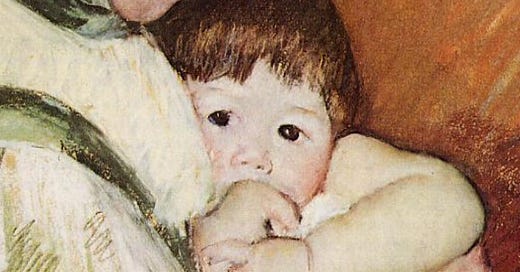Log in to the 24-Hour Room Zoom Studio on Tuesday 10/1/24 at 10:30 a.m. ET to work on this prompt in with others.
We often focus on moments of crisis, conflict or trauma in story telling. The aftermath — how characters process what has happened to them (or they have done) — can be equally if not more interesting.
When your character is stressed or distressed, where do they go for solace? Self-soothing is a skill we learn in childhood that remains with us in various adult or infantile forms throughout our lives. In the early pages of A Portrait of the Artist as a Young Man, James Joyce depicts Stephen Dedalus's homesickness at boarding school with exquisite vividness. The boys are rough and strange and everything seems cold and damp, reminding the reader of the feeling that comes after wetting the bed — "at first it is warm, then it gets cold" — that Joyce described on page one. Stephen feels so homesick, he actually looks ill, and the other boys can see it. "—What’s up? Have you a pain or what’s up with you?" a boy named Fleming asks him.
—I don’t know, Stephen said.
—Sick in your breadbasket, Fleming said, because your face looks white. It will go away.
—O yes, Stephen said.
But he was not sick there. He thought that he was sick in his heart if you could be sick in that place. Fleming was very decent to ask him. He wanted to cry. He leaned his elbows on the table and shut and opened the flaps of his ears. Then he heard the noise of the refectory every time he opened the flaps of his ears. It made a roar like a train at night. And when he closed the flaps the roar was shut off like a train going into a tunnel. That night at Dalkey the train had roared like that and then, when it went into the tunnel, the roar stopped. He closed his eyes and the train went on, roaring and then stopping; roaring again, stopping. It was nice to hear it roar and stop and then roar out of the tunnel again and then stop.
Recreating the effect of a train's roar by closing and opening his ear flaps, Stephen distracts himself from his anguish and returns to a memory that is nice — and "nice" in Portrait is not the empty pleasantness it might be in another text. It's there from the start, associated with all things good: the "nicens little boy named baby tuckoo," his mother's smell that is nicer than his father's, his mother herself — "Nice mother!"
PROMPT
For this prompt, show a character engaging in an act of self-soothing. It could be healthy or unhealthy, successful or not. Consider, too, whether you will omit or mention the event or situation that necessitated this self-soothing.




